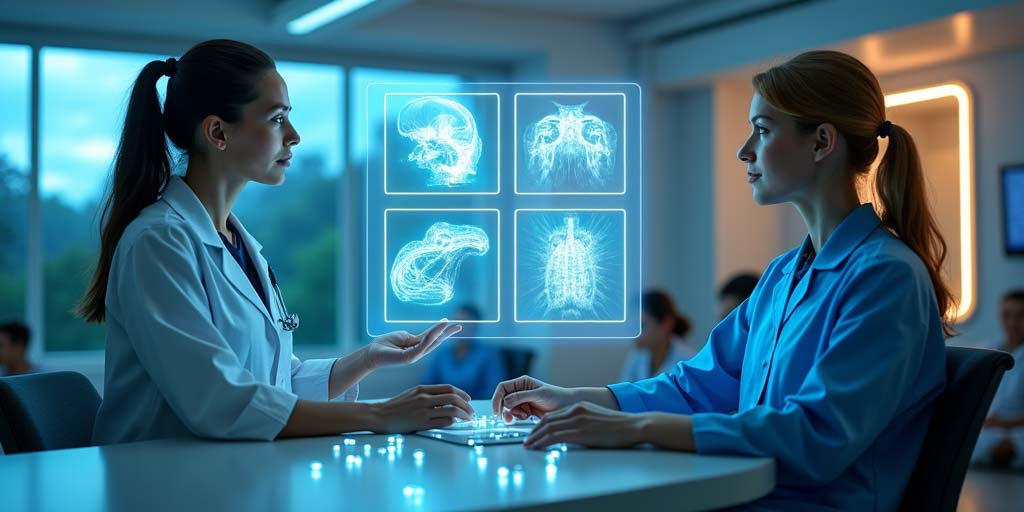Navigating 2025: Top Healthcare Trends Impacting Patient Care
As we move through the decade, the healthcare landscape is undergoing transformative changes, influenced by technological advancements, demographic shifts, and evolving patient expectations. In 2025, several key trends are reshaping how healthcare providers deliver care, ensuring that services are both effective and personalized. Understanding these trends is crucial for healthcare professionals aiming to stay ahead in their field and for patients looking to navigate the ever-evolving healthcare system.
Integration of Artificial Intelligence (AI) in Diagnostic Processes
Artificial Intelligence (AI) continues to be a game-changer in healthcare, significantly impacting diagnostic processes. AI algorithms are now capable of analyzing complex medical data much faster than human professionals. This capability enhances the accuracy and speed of diagnoses, particularly in areas like radiology and pathology.
For example, AI-powered tools can analyze thousands of radiology images to detect anomalies such as tumors or fractures, which might be missed by the human eye. In 2025, these tools are not only common but are continually learning and improving based on new data, leading to even more precise diagnoses.
Telemedicine: The New Frontline of Healthcare
The COVID-19 pandemic dramatically accelerated the adoption of telemedicine, and by 2025, it has become a mainstream method for delivering healthcare. Telemedicine offers convenience, accessibility, and cost-effectiveness, making healthcare more accessible, especially in rural or underserved areas.
Patients now routinely use telemedicine for initial consultations, follow-up appointments, and management of chronic conditions. This digital approach reduces the need for physical travel, saves time, and allows for quicker consultations. Moreover, with advancements in mobile technology, telemedicine services are now more robust, offering features like real-time monitoring of vital signs or integration with electronic health records (EHR).
Personalized Medicine and Genomics
Personalized medicine, tailored to the individual genetic makeup of each patient, continues to flourish in 2025. Advances in genomics have made it possible to design specific treatments based on a patient’s DNA profile, improving the efficacy of treatments and reducing side effects.
For instance, in cancer treatment, genomic testing helps identify the specific mutations in cancer cells, allowing oncologists to choose the most effective targeted therapies. This level of customization ensures that patients receive the most appropriate medication, avoiding the trial-and-error approach that characterized much of 20th-century medicine.
Wearable Health Technology
Wearable technology has revolutionized patient monitoring and health management by providing continuous personal health data. In 2025, these devices are not only commonplace but are also much more advanced. They monitor a wide range of health metrics like heart rate, blood sugar levels, and even stress levels, providing both patients and doctors with actionable insights into the patient’s health.
Furthermore, the integration of these devices with smartphones and health apps allows for a seamless flow of data to healthcare providers, enabling real-time health management and more dynamic, responsive care plans.
Enhanced Focus on Mental Health
Mental health has gained significant attention in the healthcare sector by 2025, with an increased recognition of its critical impact on overall health. Healthcare providers now offer more integrated mental health services, and there’s a stronger linkage between physical and mental health care.
Digital tools, including apps that provide therapy and AI-driven chatbots that offer immediate counseling, play a crucial role in this trend. These technologies make mental health care more accessible and less stigmatized, allowing individuals to seek help discreetly and conveniently.
Challenges and Opportunities
While these trends offer numerous benefits, they also pose challenges, particularly in terms of data security and ethical concerns around AI and genomics. Ensuring patient privacy and securing medical data against breaches is more crucial than ever, given the digital nature of many advanced treatments.
Moreover, as AI takes on more roles in healthcare, ethical concerns regarding bias and decision-making processes need to be addressed. Ensuring these technologies are transparent and fair is crucial to maintaining trust and efficacy in healthcare systems.
Conclusion
The healthcare landscape in 2025 is characterized by remarkable technological integration, personalized treatment plans, and an increased emphasis on patient-centric care. From AI in diagnostics to advances in genomics and the widespread use of telemedicine, these trends are not only reshaping patient care but are also setting the stage for future innovations.
As we continue to navigate these changes, both healthcare providers and patients must stay informed and adaptable to leverage these trends for improved health outcomes. The future of healthcare is here, and it promises a more personalized, efficient, and accessible care system for all.
